This blog post is provided by Someone researcher Nicole Fournier-Sylvester.
Globally networked online learning environments (GNLEs) provide students with opportunities to engage in discussions with other students from all over the world. In addition to having the potential to develop intercultural competence and critical thinking skills, these learning environments can be used to develop digital citizenship and literacy skills. Although integrating a GNLE into an existing course may seem daunting at first there are many platforms that exist to this end. Requiring different levels of commitment, the following five platforms in particular are designed to facilitate global connections between teachers and their students, from elementary school through to university.
Education Level: Elementary and high school
Global SchoolsNet provides an online space for teachers to seek out and search for opportunities that are relevant to their curriculum and objectives. The publically accessible “Projects Registry” page is, according to the site, the “the Internet’s oldest and largest clearinghouse for teacher-conducted global learning projects,” (Global SchoolNet, n.d.-a). To find a partner through the projects database, teachers first fill out a form that identifies the purpose of their collaboration, the curriculum area they are working in as well as the technology they have available for the project. Curriculum areas include: international relations, science, physical education, technology and social studies. Technology type refers to e-mail, graphics, audio, blogs, etc. (Global SchoolNet, n.d.-a). Teachers also have at their disposal “a state-of-the-art, worldwide e-learning platform, for multi-lingual, project-driven collaboration,” developed by Global SchoolNet and eLanguages, called “International Projects or Partners Place (iPoPP). IPoPP provides educators with a “supportive community and easy-to-use tools that embrace the constructivist learning methodology, project-management principles, and future thinking strategies,” iPoPP has served to connect 120,000 educators from 194 countries (Global SchoolNet, n.d.-b).
Education Level: High School and higher education
Since going online in 2013, NewsActivist has allowed thousands of students from dozens of institutions to publish their writing online and engage in global cross-classroom collaborations. Teachers have used the site to enhance courses in Geography, Ethics, Second Languages, Genetics, Theater, Business and many other disciplines, often taking advantage of the cross-disciplinary possibilities the site provides. Students are able to explore the work shared by students across classes, and teachers can develop collaborative activities and assignments through partners they find at the site. Content shared on the site is often connected to contemporary cultural and political issues. Certain features make it easy for students to find and engage with content that is related to a specific contemporary issue, from gender to the environment, and from religion to race. Students can take advantage of a variety of tools to protect their work and to share it with the audience they choose, allowing for a safe place for such issue-based dialogues. As of March 2016, some pieces of student writing published on NewsActivist have been viewed over 24,000 times. Students can personalize their own learning using NewsActivist by learning from and engaging in dialogues with other students; teachers can manage the way this process unfolds, tapping into the pedagogical potential of online publishing and collaboration.
Education Level: University
The Connect Program is a virtual exchange program that brings together university students from different parts of the world to engage in curriculum-based and facilitated cross-cultural dialogue. According to the site, the goals of the program are to:
- Establish a deeper understanding for the perspectives of others around the world on important socio-political issues and why they feel the way the do;
- Develop “21st Century Skills” such as critical thinking, cross-cultural communication and media literacy skills.
The Connect Program is used by university professors from departments such as political science, religious studies, English and communications. Once professors have registered their students, the Soliya team assigns students to different dialogue groups. Students are then committed to participate in eight weekly two-hour synchronous discussions through Soliya’s custom-built web-based videoconferencing application. These discussions are managed by two trained Soliya facilitators. As much as possible, dialogue groups are organized to ensure a balance of students from different parts if the world. To date, the program has been used in over one hundred universities in twenty-seven countries across the Middle East, North Africa, South Asia, Europe, and North America.
Education level: High school and higher education
TakingITGlobal for Educators (TIGed) is part of the non-profit organization TakingITGlobal and currently hosts 15,648 educators, 5,295 schools and 266 projects from153 countries. TIGed is designed for “globally minded educators” who are interested in developing and collaborating on international learning projects (TakingITGlobal for Educators, n.d.) TIGed provides a private, customizable and virtual classroom equipped with social networking tools including blogs, discussion boards, photo sharing, podcasting, collaborative mapping, photo sharing and video chat. The platform connects teachers across disciplines and from around the world looking for opportunities to collaborate in project-based learning and has a database of issue-oriented, curriculum-linked global education resources. The “activity database” includes TIG and teacher developed lesson plans and activity ideas address a wide range of subject areas and grade levels. In addition, the “thematic classrooms” provide complete units of instruction on global citizenship, the environment and student voice. Finally, the TIGed platform also provides professional development opportunities and in-person workshops on its key areas.
Education level: Elementary and high school
The WorldVuze platform provides an online space where students from around the world can share and explore perspectives with each other by asking and answering questions. The platform is meant to help develop critical thinking skills by having students “dig deeper to understand why they are thinking the way they do – giving them a deeper understanding of themselves, each other and their world,” (WorldVuze, n.d.). The map-based question and answer format is designed to be easily integrated into a variety of curricula. Through WorldVuze, teachers can ask questions on behalf of their class to a global community of students. Using the site teachers can also track students’ activity “allowing them to assess difficult to measure skills and competencies over time, such as critical thinking, communication and information literacy,” (WorldVuze, n.d.). WorldVuze is designed to add “real-world relevance to a wide variety of subjects by investigating the first-hand views of other students independently or directed by their teacher,” as they “creatively apply the first-hand, primary perspectives of their peers locally and around the world to research projects, class discussions and statistical analysis,” (WorldVuze, n.d.).


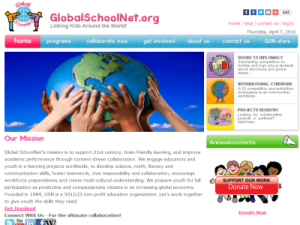
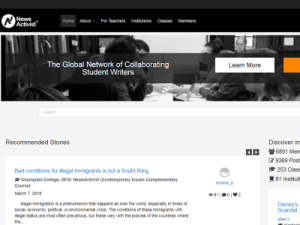
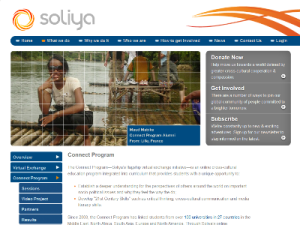
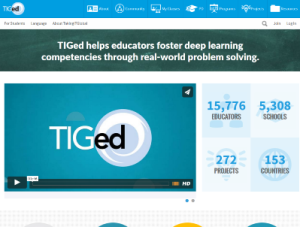
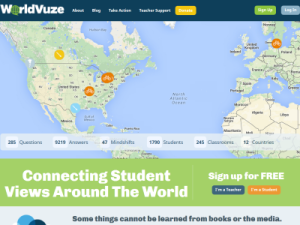


 Français
Français